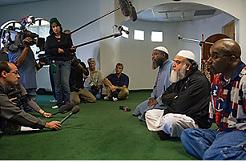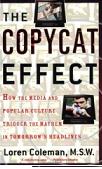Homicidal Maniacs
The Fort Hood Shooter: A News Quiz

Continue reading:
"The Fort Hood Shooter: A News Quiz" ››

 Score: 4 (4 votes cast)
Score: 4 (4 votes cast)
Why Did George Sodini Shoot Women?
Disclaimer: I never met him, didn't do an evaluation of him, etc. Basing this entirely on the log.
Continue reading:
"Why Did George Sodini Shoot Women?" ››

 Score: 24 (26 votes cast)
Score: 24 (26 votes cast)
LA Fitness Shooter George Sodini Did Not Kill Because He Was A Misogynist

Continue reading:
"LA Fitness Shooter George Sodini Did Not Kill Because He Was A Misogynist" ››

 Score: 1 (1 votes cast)
Score: 1 (1 votes cast)
Psychopaths Are Charming?
Continue reading:
"Psychopaths Are Charming?" ››

 Score: 8 (18 votes cast)
Score: 8 (18 votes cast)
Psychopathy, Antisocial Personality Disorder, and Narcissism
Continue reading:
"Psychopathy, Antisocial Personality Disorder, and Narcissism" ››

 Score: 20 (22 votes cast)
Score: 20 (22 votes cast)
"My daughter deserved to die for falling in love"
Really? Was that the reason?
Continue reading:
""My daughter deserved to die for falling in love"" ››

 Score: 25 (27 votes cast)
Score: 25 (27 votes cast)
Another School Shooting-- Sort Of?
"A student gunman remained on the loose Friday after shooting two students..." He's male. No motive known. Classes have been cancelled. School is on lockdown.
"The shooter is still at large," Carlos Holmes, a university spokesman, said at a press conference near campus. "Given the lessons of the past year, we cannot assume that he is not on campus."
The FBI is involved. And everyone wants to know: is this Cho all over again?
Before you answer, let me give you one single piece of information, that should be irrelevant, that turns out not to be.
Continue reading:
"Another School Shooting-- Sort Of?" ››

 Score: 1 (3 votes cast)
Score: 1 (3 votes cast)
Dr. Nasrallah Asks Questions That No One, Including He, Wants Answered
But I'm going to try.
His editorial appears in the journal Current Psychiatry, of which he is the editor. I respectfully disagree.
Continue reading:
"Dr. Nasrallah Asks Questions That No One, Including He, Wants Answered" ››

 Score: 1 (1 votes cast)
Score: 1 (1 votes cast)
"The Copycat Effect:" Does Reporting Violence Lead To Violence?
A reader asked me to read his book before saying that copycat suicides is not a real phenomenon.
To be fair, his book is really good. It is worth the price even as a reference guide/catalog of suicides and homicides that share similar characteristics, which are striking. While the majority of the information is a google search away, the fact is that he actually did the searches. It's also a good read-- it neither bores you nor crams the conclusions into your head.
But, I respectfully disagree. I think.
The main disagreement I have with the book is that he conflates two phenomena. His stated thesis of the book is that media reporting of violence and suicides begats copycats. However, in support of this premise, he uses examples of the media itself (e.g. movies) causing copycats.
A perfect example of this is the Werther Effect, so named for the Sorrows of Young Werther, the 1774 comic book by Goethe in which the protagonist kills himself because he can't get the girl. Subsequently, there were numerous copycat suicides-- staging it (same clothes, same desk) as Werther in the novel. Ok, I get it-- that's a copycat. But that's not an example of media reporting causing copycats.
In contrast, here's an example of a reporting-induced copycat: Coleman relates the Bergenfield Four. For a few months, there were rumors that a bunch of kids who called themselves "The Burnouts" had made a suicide pact. In September of 1986 their leader killed himself; in March of 1987 four others carbon monoxided themselves in a parking garage, leaving a note that clearly linked the deaths. One week after that, a cop found two other kids trying to do the same thing in the same garage. The day after the original four suicides, but in Illinois, two other teens suicided the same way (in a garage, in fact.) Coleman writes that by checking newspapers, he counted 22 teen carbon monoxide suicides in two weeks-- 47 in a month.
But then there's the case of Barry Loukaitis, who in 1996 shot two kids and a math teach, and said he got the idea from Stephen King's Rage, Pearl Jam's Jeremy, Natural Born Killers and The Basketball Diaries. Coleman writes that "the media attention...triggered a series of similar events." So, in these copycats, was it Basketball Diaries or the evening news? It's hard for me to see how the news can be more influential to a suicidal kid than the movie itself-- do kids even watch the news?
In fairness, he does cite numerous examples of media reporting induced copycats (check out the chapter "Planes Into Buildings" for a wild ride) but overall the argument is weakened by using both together. I left the book reasonably convinced that media can inspire copycat violence, but not that they inspire violence itself. In other words, I think those Werther scholars were going to kill themselves somehow, but they decided to shoot themselves (as oppposed to self-immolation) because of the book.
The distinction-- media or media reporting-- is important because the solutions are different. Here's an example: the book opens with the story about how one month after Marilyn Monroe's suicide, 197 (mostly blonde women) "appear to have used the model," to suicide-- an increase in the suicide rate of 12%. Furthermore, the suicide rate never went down after that. "This is the copycat effect working with a vengeance." Maybe. Or maybe the graphic description of the suicide wasn't to blame, but rather that a huge icon had done it at all. Are they copying her, or is society ripe for self-destruction? Either way, should we not report that Monroe killed herself at all? How much do you control information to protect the people? If the government is doing the controlling, then I can't imagine the answer should be anything other than "not at all, get the hell out of my face."
I've always said that the "mainstream media" is neither liberal nor conservative-- they are sensationalist. Of course I think they overreport, and overdramatize unusual violence. But I see that as more of a symptom of our culture than the cause of anything. You could close down all news portals, it won't change the amount of violence. Sure, maybe you wouldn't have thought of playing Russian Roulette. But you were going to come up with something.
Coleman wrote a thorough book, using the type of diligent research the CIA is supposed to be good at: compiling open source information and forming links. I only partly disagree with his conclusion, and I am still open to further arguments. But I am against the solution.
It's worth remembering that, in response to the copycat suicides, Sorrows of Young Werther was banned in Germany. I know I am one of only 8 people who has actually read it, but do we really want it banned? Maybe "dangerous" books need to be delayed by a generation to be published? And you see my problem.
Absent direct power or wealth, the only thing that keeps us free is information. I believe it is worth the risk of copycat suicides, especially since influencing the choice of the method of suicide isn't the same as influencing the choice of commiting suicide.

 Score: 2 (4 votes cast)
Score: 2 (4 votes cast)
Another Final Word On Cho's Mental Illness
Hi. Not surprisingly, many peoples have not liked my Cho comments. Here's an example from a psychiatrist, and I responded with a comment there that I might as well put here.
As background, most people are yelling, "how the hell can you say this guy wasn't crazy? He was talking to imaginary friends, he thought he was an Ax, etc." As point of fact, these weren't delusions because he knew they weren't true, but that's a side point.
Psychiatric pathology exists on a spectrum. It's not binary "ill" or "not ill," and impairment in one realm doesn't explain impairment elsewhere. A diagnosis does not define all of your existence, or even all of your actions.
I should not, however, have said he wasn't mentally ill. What I should have said was he was not insane: he knew what he was doing, he knew what he was doing was wrong, and he had the ability to control himself. So he is entirely to blame, i.e., the mental illness, even if substantial, is incidental.
You might say, ok, he's not insane, but only someone with a mental illness would do this. It doesn't lessen his culpability, however.
Well, actually, it does: you can't execute the mentally ill, for example. Forget about your personal stance on the death penalty. Fact is, mental illness is rapidly becoming an exclusion to a sentence that everyone else is subject to. I know, it seems so righteous to say the mentally ill shouldn't be executed. Ok, here: it would mean you can be sentenced to death, but he can't. Does that make any sense, moral or legal?
Clearly, maladjusted and sexually frustrated college kids don't often go on rampages, so there was something in him that moved him to this. Perhaps that was the mental illness. But add up the body counts in the past twenty years. What's in common in mass murderers isn't mental illness, but frustration, impotence (metaphorical) and anger. Or are all those suicide bombers in Israel bipolar?
You'll say, "but he wasn't a suicide bomber." His mental framework had much more in common with a suicide bomber than with John Wayne Gacy.
But let's put this aside and ask a different question, about us, not him: why do so many people want him to be mentally ill? Because its an explanation that doesn't implicate society, or themselves. It means the world can be divided into "us" and "them," which is always fun. It's the easy scapegoat that seems to be so obvious as to be unassailable.
And if it is mental illness, what do we intend on doing about it? My bias implies harsher sentences, societal changes, etc-- we can debate that later. But if it is all mental illness, then what? Do we lock up the "mentally ill" like we do pedophiles and terror suspects, before they even commit a crime, just on suspicion? And who decides who is suspicious? Psychiatrists? Do you trust every psychiatrist to be good at this? Or should it be the government?
Would you have been happy-- I mean this in all seriousness-- if George Bush had Cho arrested last year for being a terror suspect? Which part of that bothers you? It would have been legitimate, because he was dangerous. So is it that he was arrested before he committed a crime, or that George Bush did it? See? This is what you'll have to contend with with these policies.
Oh yeah. Treatment. You want to make "treatment" mandatory? Great. Tell me exactly who should decide who needs treatment, and for how long, and what kind. And tell me how this treatment is going to work-- what is the specific end point?-- and for how long, and tell me what we should do when the treatment doesn't work.
You can't just make this stuff up as you go along, enacting policies which are politically expedient but destroy the society. Ask Vladimir Putin. Oh, wait, bad example.

 Score: 2 (2 votes cast)
Score: 2 (2 votes cast)
University Shootings: I'm Sure It's All Just A Coincidence
While preparing the post on the unusual characteristics of the suicides at MIT, I looked up university shootings and found, well... draw your own conclusions:
Dec. 6, 1989: Gamil Gharbi, 25, engineering student at the University of Montreal, kills 13 women and wounds others (he released the men.)
Nov. 1, 1991: Gang Lu, 28, physics grad student at the University of Iowa, shoots his dissertation advisor and five people and himself.
Aug. 15, 1996: Frederick Davidson, 36, grad student in engineering at San Diego State, shoots three professors at his dissertation defense.
Aug. 28, 2000: James Easton Kelly, 36, a grad student at the University of Arkansas, dropped from the PhD program and shoots his dissertation advisor and himself.
Oct. 21, 2002: Huan Xiang, 38, senior at Monash University (Australia) uses five 9mms to kill two students and wound others before being subdued.
May 10, 2003: Biswanath Halder, 62, former student, returns to Case Western with two 9mm and opens fire, supposedly over a failed lawsuit against the school.
Oct. 28, 2002: Robert Flores, 40, Gulf War vet and failing out of University of Arizona Nursing College, comes in with 5 guns and shoots three teachers and himself.
Jan. 16, 2002: Peter Odighizuwa, 42, grad student recently dismissed from Virginia's Appalachian School of Law, shoots the Dean and a few others before getting subdued by students.
Sept. 13, 2006: Kimveer Gill (fun pics here), 25, opens fire with automatic weapons at Dawson College (Montreal), kills 20 and himself.
And, of course, April 16, 2007: , Cho Seung Hui, 23, the not mentally ill former stalker of two women who shot up Virginia Tech.
So graduate school is so stressful it makes people snap? Or is that just the Gulf of Tonkin?
Too old, too disconnected, too-- weird-- to be accepted or acceptable in a closed environment where social life is as important, if not more important, than academic performance; where individuality is really flavored homogeneity ("no, dude-- my iPod is white"); where "what frat?" says more than "what major?"; riding the internet while everyone gets a lot more sex, with a lot better looking people, than you; and, the last straw, your only claim to university related self-esteem gets forcibly "taken" from you.
And no, it's not the universities' fault, and it's not the media's fault, it's not mental illness, antidepressants, the "permissive society," porn, or lax gun laws. These are the convenient banalities politicians will use to appeal to a mindless base. No. This is what happens when you don't know who you are. And it is only going to get worse.

 Score: 3 (3 votes cast)
Score: 3 (3 votes cast)
Is Cho The Question?
Quick speculation. As 13 year old kids like this usually create an identity from multiple sources- so far we're pretty sure the main movie was Oldboy-- I wonder if he didn't also identify with the Question (the comic). He signed his name as a question mark, he wore the same baseball cap, gloves with short sleeve shirt. And, in case you weren't once a lost male adolescent, the Question is Vic Sage, ex-philosophy major turned TV reporter who is also a vigilante. And the 30+ issues are all about his struggle with identity.
None of this is relevant to why he did it, of course. It's fun to speculate, but of no predictive value. These are costumes, roles. They just help him "get into character," which in this case is a man alone fighting injustice, greed, and abuse, using whatever tools he has. Of course, he was fighting college kids, and his tools were semi-automatics, but who am I to dispel a good illusion?
Finally, let me reiterate that the presence or absence of mental illness is irrelevant, at least as far as prediction goes. So let's say he was a violent schizophrenic. Would you jail him before he commits a crime, just in case? Bush does that with Guantanamo, you know. Do you send him to a psych hospital, like they do/did in the USSR? That process will be magnificently abused by your government, I assure you.

 Score: 0 (2 votes cast)
Score: 0 (2 votes cast)
A Final Thought On Cho's Mental Illness
A thoughtful reader concerned about backlash against the mentally ill asked me to write a piece basically saying that not all mentally ill people were homicidal maniacs.
It's a fair request, but in this case it's counterproductive. Here's what I mean: you want to say that "not all mentally ill people are violent." You want counterexamples to Cho's example. But that's a defensive posture, unnecessary because... Cho wasn't mentally ill. He was a sad, bad man who killed people because his life wasn't validated. There was no psychosis, there was no cognitive impairment, there was no psychiatric impairment in insight in judgment. There was a lack of sex, but that's not yet in the DSM.
Not to reduce his life down to a soundbite, but he was a guy who thought he deserved better by virtue of his intelligence and suffering; found himself in a sea of mediocrity but couldn't understand why he couldn't therefore excel; and, worst of all, found that all the things he thought he deserved eluded him-- especially hot chicks, who not only dismissed him and found him creepy, but, worse, chose to be with the very men he thought were obviously inferior to him. It's Columbine all over again. It's almost even the same day.
Forget the Prozac, forget the involuntary commitment (where he was found by the court to be "a danger to himself and others"-- that's standard boilerplate, it is clinically meaningless). Those are red herrings. You may as well blame wearing black t-shirts. He's not mentally ill; he's an adolescent.
The difference, the single difference, between us and him is that when we were sulking in high school, we listened to Pink Floyd or U2. He watched Oldboy. We had a battered copy of a Playboy down at the creek under a rock, that was so creased we had to infer the boobs. He had the internet. Maybe we bought a pocket knife, or-- wow-- a butterfly knife. He bought two Glocks.
In other words, the difference is this: he decided to shoot 30 people, and you didn't. That's it. I know it's not a satisfying answer, I know we want explanations, but there aren't any. Forget genes, forget DSM. He chose to do something bad, he knew it was bad, but he did it anyway.
Don't worry about the mentally ill. Worry about the nut politicians and media outlets who will look to the easy and convenient excuse of mental illness, rather than have to do the hard work of figuring out why our society is melting.

 Score: 6 (6 votes cast)
Score: 6 (6 votes cast)
Cho Seung Hui: It's The Movies, Stupid
I still haven't had time to really look at this situation, but I have to address this nonsense about his psychiatric history: it's irrelevant.
He didn't do this because he was on Prozac, or he was Bipolar. Look at it the other way: are we going to say that people with bipolar are more likely to go homicidal? If so, should we do a Kansas v. Hendricks for bipolars? (in which the Supreme Court said it was ok to lock up pedophiles indefinitely, even in the absence of a crime, since "pedophilia" makes you a priori dangerous.)
If you want to really understand why he did it that way, you have to find out what article of media he was imitating. Take the photos, the manifesto, and google it until you find the movie the handguns came from; the book (or comic book) the manifesto came from. He didn't come up with this stuff on his own, he is imitating something. For Klebold and Harris it was the Matrix and Doom. What movie is he imitating? Find it.
Because it isn't about mental illness, or genetics. It's about identity, it's always about identity, and sometimes the identity you choose doesn't work out that well. So, emergently, you grab an identity which has appeared to work-- you imitate a movie, a game, a comic.
I'm not saying movies made him do it; I'm saying he was looking for an excuse to do it, and he went through the usual catalog: movies, comics, games. Come hell or high water, he was going to kill someone. But in terms of prediction, the operative question is, if this guy goes homicidal, how will he do it? He didn't strap explosives to his chest, not because it wasn't available, but because it didn't match the identity he wanted to have-- that he got from a TV show or movie.
Ismael Ax, handgun to the head, hammer cocked like a bat to the right, knife to the neck-- all those stills from his video clips you see on CNN aren't random, they're a specific imitation of something else. Find the thing he was imitating, and you have found him.
Because he didn't exist, that's the problem. He picked an identity, and no one liked it, it backfired- no chicks-- so he moved to plan B: pick an identity that absolves him of the guilt of shooting 30 people.
Stop looking in the DSM. Start looking in IMDb.

 Score: 3 (3 votes cast)
Score: 3 (3 votes cast)
Cho Seung-Hui is Ismail Ax

 Score: 0 (0 votes cast)
Score: 0 (0 votes cast)
The APA Says The Media Is Making Women Really Hot
So the APA has come out against the sexualization of women in the media. Praise Jesus. And not a moment too soon.
Oh my God. If society could just expand it's historical horizon past winter, we'd realize that women have been sexualized for centuries. It's only in modern times that women are allowed to be in control of it.
No. I'm not worried about girls, What we should be worried about are the boys. What happens to a boy who is told by the media that women are sexualized, they are objects, they are sluts? And then he goes out into the world and discovers they aren't? That they won't sleep with him? That, try as he might, they won't do all the things he was promised in ads, movies, porn? But they might be willing to do it with someone else, even women?
Depression? Or maybe misogyny? And maybe he starts hating women so much he, oh, I don't know, shoots 30 people at a college?
Women have been tweezing and preening and primping since day uno. Near as I can tell, porn hasn't drastically altered this. Interestingly, it has made young men more self-conscious, not just about penis size, but also body hair, fat, fingernails, etc. The cultural problem is neurotic, immasculated men whose only outlet is masturbation and violence.
Are we going to be honest or political? I don't know any women who if given a choice would prefer "not sexy" over "sexy." If I have a daughter, I would want her to be in control of her sexuality, not under the control of it (in other words, the opposite of me.) I want her to be smart and sexy. I just want her to be her.
No. No, the problem isn't my daughter becomes a slut; it's that she gets beaten by some whacko who wants her to be. Or doesn't want her to be. Or does, but only when...
The real problem for the women of our society isn't a lack of self-esteem. It's a lack of weapons.
And no, I'm not kidding.

 Score: 24 (24 votes cast)
Score: 24 (24 votes cast)
For more articles check out the Archives Web page ››

